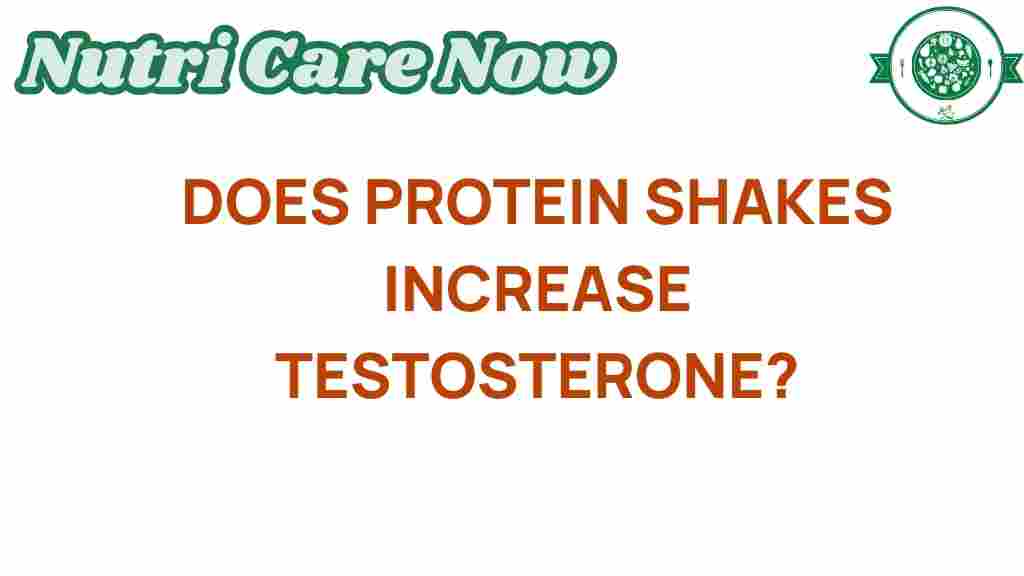Unraveling the Truth: Do Protein Shakes Really Boost Testosterone?
In the realm of fitness nutrition, protein shakes have become a staple for many athletes and fitness enthusiasts. With claims that they can aid in muscle growth and improve overall health, a question that often arises is whether protein shakes can also boost testosterone levels. This article delves into the science of protein, examines the relationship between protein shakes and testosterone, and explores the health benefits that come with consuming these dietary supplements.
The Importance of Testosterone
Testosterone is a crucial hormone in the body, particularly for men, influencing numerous aspects of health and fitness, including:
- Muscle Growth: Testosterone plays a vital role in building muscle mass and strength.
- Fat Distribution: It helps regulate body fat and muscle composition.
- Bone Density: Testosterone is essential for maintaining healthy bones.
- Libido and Mood: It influences sexual drive and can affect mood and energy levels.
Understanding the factors that influence testosterone levels is key to optimizing health and fitness.
Protein Shakes and Their Role in Fitness Nutrition
Protein shakes are dietary supplements often consumed post-workout to aid in recovery and muscle growth. They typically contain whey, casein, soy, or plant-based proteins, which are essential for repairing muscles after exercise. But how do they fit into the conversation about testosterone?
The Science of Protein and Hormonal Balance
Research suggests that adequate protein intake is necessary for maintaining hormonal balance, including testosterone. Here’s how protein shakes may contribute:
- Adequate Protein Intake: Consuming enough protein can lead to increased levels of testosterone, especially in individuals who exercise regularly.
- Muscle Repair and Growth: Protein shakes provide the necessary amino acids for muscle repair, which can indirectly support testosterone production as muscle mass increases.
- Weight Management: High protein diets are associated with lower body fat percentages, which is linked to higher testosterone levels.
How Protein Shakes Might Influence Testosterone Levels
While protein shakes are not a direct testosterone booster, they may contribute to an environment that supports healthy testosterone levels. Here’s a closer look:
- Post-Workout Recovery: Consuming protein shakes after workout sessions can aid in recovery, allowing for more intense and frequent workouts, which in turn can help boost testosterone.
- Weight Loss: If protein shakes are used as meal replacements or in calorie-controlled diets, they can assist with weight loss. Lower body fat percentages correlate with higher testosterone levels.
- Muscle Mass Preservation: Maintaining muscle mass as you age is crucial for sustaining testosterone levels, and protein shakes can be a convenient way to support this.
Comparing Different Types of Protein Shakes
Not all protein shakes are created equal. Here’s a breakdown of some popular types:
- Whey Protein: Fast-digesting and rich in branched-chain amino acids (BCAAs), making it ideal for post-workout recovery.
- Casein Protein: Slow-digesting, making it suitable for nighttime use to support recovery during sleep.
- Plant-Based Proteins: Options like pea, hemp, and brown rice protein cater to vegans and those with lactose intolerance.
- Protein Blends: Combining different sources to provide a balanced amino acid profile.
Choosing the right protein shake can depend on individual dietary needs, fitness goals, and any dietary restrictions.
Step-by-Step: Incorporating Protein Shakes into Your Diet
To maximize the potential benefits of protein shakes for testosterone and overall health, consider the following steps:
- Determine Your Protein Needs: Assess your daily protein intake based on your fitness goals, weight, and activity level.
- Choose the Right Protein Shake: Select a protein shake that aligns with your dietary preferences (whey, casein, plant-based).
- Timing Matters: Consume protein shakes post-workout for optimal recovery, or as a meal replacement if needed.
- Pair with Whole Foods: Combine protein shakes with whole food sources of protein, healthy fats, and carbohydrates for balanced nutrition.
- Monitor Your Progress: Keep track of changes in muscle mass, strength, and energy levels to assess whether your protein shake consumption is beneficial.
Potential Troubleshooting Tips
If you find that protein shakes are not yielding the expected benefits, consider the following troubleshooting tips:
- Check Your Overall Diet: Ensure that your overall nutrition aligns with your fitness goals. Protein shakes should complement a balanced diet.
- Assess Portion Sizes: Consuming too much protein can lead to digestive issues. Find the right amount for your body.
- Stay Hydrated: Adequate hydration is essential for optimal performance and recovery.
- Consult a Professional: If unsure, consult a nutritionist or dietitian to tailor a nutrition plan to your needs.
Health Benefits of Protein Shakes Beyond Testosterone
While the focus of this article is on testosterone levels, protein shakes offer several additional health benefits:
- Convenient Nutrition: Protein shakes are quick and easy to prepare, providing a convenient source of protein.
- Supports Weight Management: High-protein diets can help control appetite and reduce cravings.
- Aids in Muscle Recovery: Essential for those engaged in intense training routines.
- Boosts Immune Function: Certain protein sources can enhance immune response, especially during heavy training.
Conclusion
In conclusion, while protein shakes may not directly boost testosterone levels, they play a significant role in supporting muscle growth, workout recovery, and overall fitness nutrition, all of which contribute to hormonal balance. By incorporating protein shakes into a well-rounded diet and exercise regimen, individuals can harness the health benefits they offer. Ultimately, understanding the science of protein and its impact on the body is essential for anyone looking to enhance their fitness journey.
For more information on dietary supplements and their effects, visit Healthline.
To explore more about fitness nutrition, check out our article on nutritional strategies for muscle growth.
This article is in the category Supplements and created by NutriCareNow Team
